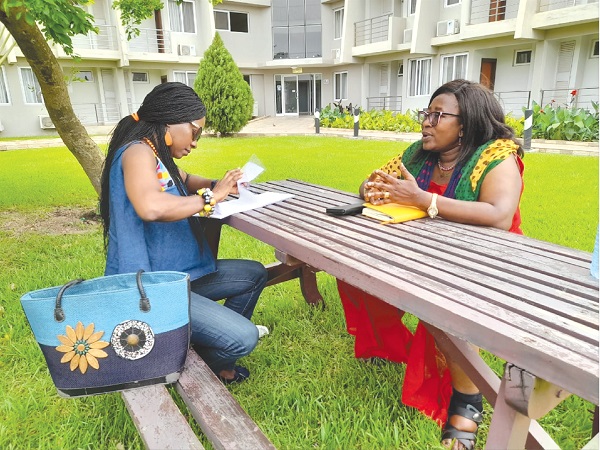
International Women’s Day: Female experts advise women, girls to embrace digital technology
Three Ghanaian women experts in information and communications technology (ICT) have urged Ghanaians, particularly women and girls, to embrace digital technology literacy to remain relevant in the current dynamic world.
They said digital technology was responsible for moving development across the world, and for women and girls to contribute effectively towards the development of the country, there was the need for them to be knowledgeable in the digital technology space and use the tools effectively.
Those who shared their views in exclusive interviews with the Daily Graphic ahead of the International Women’s Day today are the Director of Science Education at the National Science, Technology, Engineering and Mathematic (STEM) Resource Centre of the Ghana Education Service, Olivia Serwaa Opare; the Board Chairperson of Ghana Domain Name Registry (GDNR), Rev. Dr Nana Yaa T. Owusu-Prempeh, and the Ag. Manager, Infrastructure Support of Republic Bank Ghana, Dilys Efua Asaam.
International Women's Day
International Women's Day is a global celebration of the social, economic, cultural and political achievements of women. The day also marks a call to action for accelerating women's equality.
The global theme for this year is, "DigitALL: Innovation and technology for gender equality".
The theme explores the impact of the digital gender gap on widening economic and social inequalities.
It also throws a spotlight on the importance of protecting the rights of women and girls in digital spaces and addressing online and ICT-facilitated gender-based violence.
Tech good
Describing technology as good, Mrs Opare said it was what was ruling the world now and that was why it was necessary for women and girls to embrace it so that the nation could move forward in its development and also be able to compete favourably globally.
The STEM Resource Centre Director said it was for that reason that STEM education was being promoted throughout the country, from pre-school to the university level.
Mrs Opare added that considering the direction in which the world was moving, if the country's curriculum did not respond to the global digital technology agenda, it risked being left behind.
"When you exclude women and girls from technology or any digital literacy, there wouldn't be any development. If you exclude us, the Ghanaian society will die and there wouldn't be creativity and innovation because technology is all about innovation and you want to shield them from thinking," she said.
For her part, Rev. Dr Owusu-Prempeh, who was the first person to start Voice Over Internet Protocol in Ghana, said any woman in today's world who deprived herself the knowledge of the digital space was disadvantaging and disenfranchising herself because technology had come to stay.
"It is propelling the future and growth. It is the tool that enhances what you have, what you don't have and what you don't know. Development is key to every nation's success and technology is the driver," she pointed out.
Touting the benefits of technology, Rev. Dr Owusu-Prempeh said it had now transformed the education system, health, real estate industry, love and marriage and was even affecting child development and, therefore, stressed the need for women and girls to embrace it.
She urged women who were in positions of authority to go the extra mile to support females who were qualified for roles in the domains.
For her part, Ms Asaam pointed out that technology cut across the work industry and it would, therefore, be out of place for any society to exclude females from it.
"Women are smart, have a strong analytical mind, keen at paying attention to detail and have proven to be great at multitasking which are attributes needed to thrive in the world of technology. The exclusion of women may be unintended, perhaps because the world's policies are mostly driven by men. The detriment of this is creating a society of women who continue to believe their lot is what society tells them and they cannot go further than that,” Ms Asaam said.
"This approach deprives the nation of great inputs that women could make in the technology industry which could resolve many of the problems we have as a nation," she added.
Getting more women, girls in technology
Although all three experts acknowledged that the nation had done well in getting women and girls into the digital technology space, they stressed the need to get more of the women and girls there.
The Director of Science Education, who is also a member and Deputy Focal Point for African Union/NEPAD Calestous Juma Executive Dialogue, called for increased sensitisation and the putting in place of all the right things that would encourage more women and girls to enter the technology digital space.
Ms Asaam also called for motivation, awards, exposure and engagement of girls with various international challenges which used technology to solve problems such as climate change, pollution and sanitation in the world.
On how to get more women into the space, the board chairperson of Ghana Domain called on the state to search and reach out to women with digital technology, adding that people still had the notion that women did not know anything when it came to technology.
However, Rev. Dr Owusu-Prempeh said there were many accomplished women in that space, adding that although they were not enough, they were notable.
Protection
On protecting women and girls in the digital space, Rev. Dr Owusu-Prempeh pointed out that the Legislative Instrument that established the GDNR and the Electronic Transaction Act, 2008 (Act 772), had a data protection provision which protected information sharing.
She asked anyone who felt their rights had been violated in the digital space to take advantage of the Act and go to court.
Mrs Opare asked girls and women to be mindful of how they portrayed themselves in the digital space, pointing out that they should remember they were dealing with human beings.
